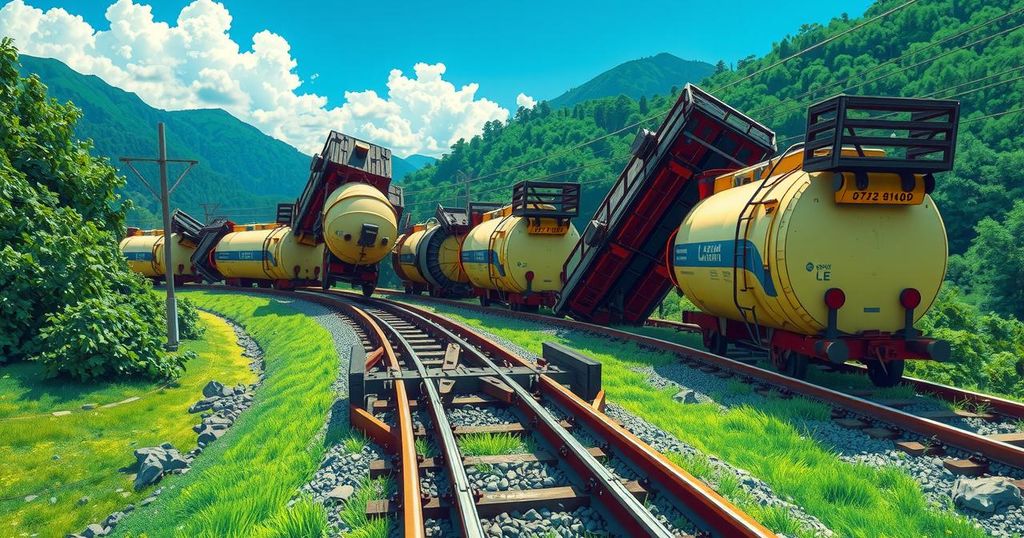Cuba’s Transportation Minister Addresses Recent Train Derailment in Matanzas

Cuba’s Transport Minister Eduardo Rodríguez Dávila responded to a train derailment in Matanzas, where the Tren Extra 924 derailed five tankers while carrying rum. The incident caused no fatalities but highlighted ongoing issues with the country’s railway infrastructure. Emergency measures were taken, and investigations are underway, reflecting broader concerns about transportation safety in Cuba.
Cuba’s Transportation Minister Eduardo Rodríguez Dávila has responded to the recent train derailment incident in Matanzas that caused quite a stir in rail transport. The mishap took place at kilometer 80.500 along the Central Line, close to the Mocha station. The Tren Extra 924, which was transferring rum from a distillery in Sancti Spíritus to a factory in Santa Cruz del Norte, derailed five of its tankers, leading to an overturned car that caught fire.
The incident did not just affect rail service; it impacted the surrounding area significantly. Aside from one car that caught fire, two were left partially overturned, while the others stayed on the tracks, disrupting about 100 meters of the railway line. In a statement on social media, Minister Rodríguez Dávila remarked that the derailment is “something more than a railway accident.” This comment underlined the seriousness of the situation, suggesting underlying issues within the railway system.
On-site reports indicated that the Minister, who was inspecting work at the Havana Bay tunnel at the time, promptly headed to the derailment location to gauge the damage firsthand. Emergency measures were implemented as a response, particularly affecting the Havana-Holguín train, which was rescheduled, and the Guantánamo-Havana train, now temporarily halted. Fortunately, though, there were no human casualties.
Despite the lack of fatalities, this incident is emblematic of a series of recent railway accidents in Cuba. Earlier this year, in April, another train derailed while traveling the Holguín-Havana route, without causing injuries. A couple of months before that, in December 2024, a collision between two freight trains in Sancti Spíritus led to an oil spill, with investigations blaming regulatory violations for the chaos. There have been numerous accidents in recent months, raising concerns about railway safety and infrastructure integrity.
Following the Matanzas accident, further investigations are underway to uncover the root causes of the derailment. The Minister expressed the hope that superior measures will emerge to deter such occurrences in the future. This particular incident raises alarm bells about Cuba’s aging railway infrastructure, an ongoing issue that has often been cited by critics who blame the government for insufficient maintenance and oversight.
In summary, the Matanzas train derailment has highlighted serious concerns about the state of railway transport in Cuba, an issue that has seen growing scrutiny. The government’s ongoing responses, such as immediate emergency measures and investigations, indicate an acknowledgment and urgency to rectify the pressing infrastructure problems. The trend of recent accidents, marked by human error and infrastructure failures, further stresses the need for comprehensive reforms within the country’s railway system.
The recent train derailment in Matanzas, while thankfully resulting in no loss of life, exposes deeper systemic issues within Cuba’s railway infrastructure. The immediate response by the Minister of Transportation reflects an attempt to address the situation proactively. However, ongoing investigations and the patterns of prior accidents point toward a critical need for reforms to enhance safety and reliability in Cuba’s rail transport system. This incident adds to the dialogue about the deterioration of public transport in the country, driving home the urgency for change.
Original Source: en.cibercuba.com






